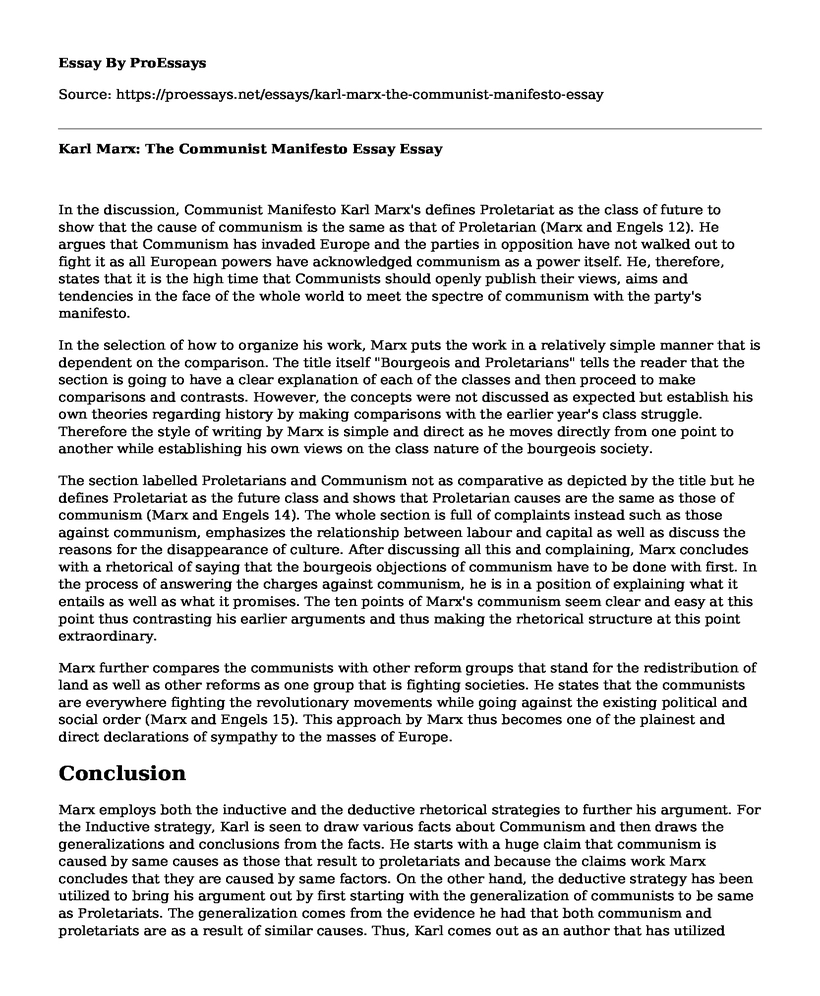In the discussion, Communist Manifesto Karl Marx's defines Proletariat as the class of future to show that the cause of communism is the same as that of Proletarian (Marx and Engels 12). He argues that Communism has invaded Europe and the parties in opposition have not walked out to fight it as all European powers have acknowledged communism as a power itself. He, therefore, states that it is the high time that Communists should openly publish their views, aims and tendencies in the face of the whole world to meet the spectre of communism with the party's manifesto.
In the selection of how to organize his work, Marx puts the work in a relatively simple manner that is dependent on the comparison. The title itself "Bourgeois and Proletarians" tells the reader that the section is going to have a clear explanation of each of the classes and then proceed to make comparisons and contrasts. However, the concepts were not discussed as expected but establish his own theories regarding history by making comparisons with the earlier year's class struggle. Therefore the style of writing by Marx is simple and direct as he moves directly from one point to another while establishing his own views on the class nature of the bourgeois society.
The section labelled Proletarians and Communism not as comparative as depicted by the title but he defines Proletariat as the future class and shows that Proletarian causes are the same as those of communism (Marx and Engels 14). The whole section is full of complaints instead such as those against communism, emphasizes the relationship between labour and capital as well as discuss the reasons for the disappearance of culture. After discussing all this and complaining, Marx concludes with a rhetorical of saying that the bourgeois objections of communism have to be done with first. In the process of answering the charges against communism, he is in a position of explaining what it entails as well as what it promises. The ten points of Marx's communism seem clear and easy at this point thus contrasting his earlier arguments and thus making the rhetorical structure at this point extraordinary.
Marx further compares the communists with other reform groups that stand for the redistribution of land as well as other reforms as one group that is fighting societies. He states that the communists are everywhere fighting the revolutionary movements while going against the existing political and social order (Marx and Engels 15). This approach by Marx thus becomes one of the plainest and direct declarations of sympathy to the masses of Europe.
Conclusion
Marx employs both the inductive and the deductive rhetorical strategies to further his argument. For the Inductive strategy, Karl is seen to draw various facts about Communism and then draws the generalizations and conclusions from the facts. He starts with a huge claim that communism is caused by same causes as those that result to proletariats and because the claims work Marx concludes that they are caused by same factors. On the other hand, the deductive strategy has been utilized to bring his argument out by first starting with the generalization of communists to be same as Proletariats. The generalization comes from the evidence he had that both communism and proletariats are as a result of similar causes. Thus, Karl comes out as an author that has utilized conflicting strategies to bring out his argument.
Works Cited
Marx, Karl, and Friedrich Engels. "The Communist Manifesto." 2017.
Cite this page
Karl Marx: The Communist Manifesto Essay. (2022, Jun 19). Retrieved from https://proessays.net/essays/karl-marx-the-communist-manifesto-essay
If you are the original author of this essay and no longer wish to have it published on the ProEssays website, please click below to request its removal:
- Rumors and Gossip Essay
- Quebec Population Immigration and Employment Essay
- The Economic Implications of Government Control Over the Interest Rates Essay
- Jenny Boully's 'A Short Essay of Being' Analysis Paper Example
- Essay Sample on Post-war Economic Changes in America
- Essay Example on Renaissance Era: Music & Universe Changes (1450-1600)
- Essay Sample on Monopoly: Market Structure & Natural Resource Control







